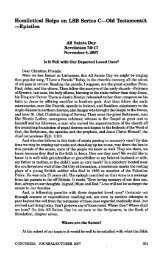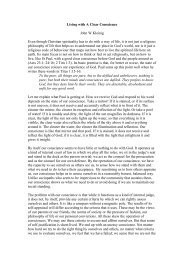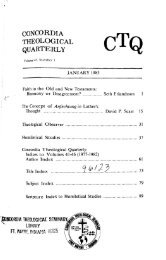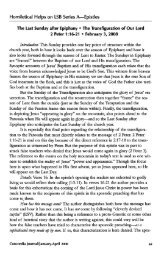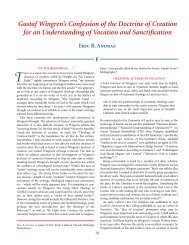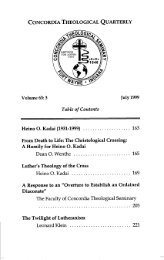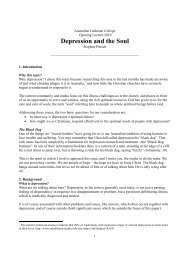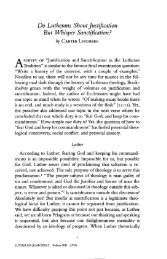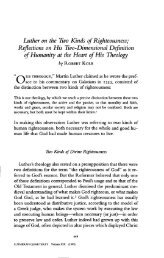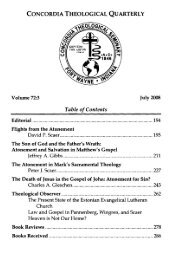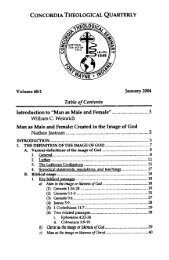Nature and Institution: Luther's Doctrine of the Three Orders
Nature and Institution: Luther's Doctrine of the Three Orders
Nature and Institution: Luther's Doctrine of the Three Orders
You also want an ePaper? Increase the reach of your titles
YUMPU automatically turns print PDFs into web optimized ePapers that Google loves.
146 LUTHERAN QUARTERLY<br />
The precise meaning <strong>of</strong> <strong>the</strong> statement in <strong>the</strong> Confession that<br />
"even <strong>the</strong> godless may have much about <strong>the</strong>m that is holy without<br />
being saved <strong>the</strong>reby" 127 is elucidated by this commentary on Psalm<br />
127. The intended distinction <strong>and</strong> attribution <strong>of</strong> hea<strong>the</strong>n (although<br />
divinely ordained) humanity, <strong>and</strong> <strong>the</strong> salvation brought by Jesus<br />
Christ, is effected in <strong>the</strong> commentary on Psalm 127 by <strong>the</strong> way in<br />
which Lu<strong>the</strong>r approaches <strong>the</strong> scheme <strong>of</strong> <strong>the</strong> four causae. 128<br />
Insight into <strong>the</strong> material <strong>and</strong> formal cause <strong>of</strong> social life <strong>and</strong> <strong>the</strong><br />
arts, in short, <strong>the</strong> exercise <strong>of</strong> reason, is conceded to Aristotle, Demos<strong>the</strong>nes,<br />
<strong>and</strong> Cicero. 129<br />
This praise, however, is not unqualified. 130 It is <strong>the</strong>ir failing—as<br />
it is <strong>the</strong> failing <strong>of</strong> all <strong>the</strong> godless—that <strong>the</strong>y desire to be <strong>the</strong>mselves<br />
<strong>the</strong> efficient cause <strong>and</strong> <strong>the</strong> final cause to create <strong>and</strong> perfect economy<br />
<strong>and</strong> politics. "This, however," says Lu<strong>the</strong>r, "is not for you";<br />
yours is but to "be an instrument." 131 But anyone who is not content<br />
to be God's instrument <strong>and</strong> m<strong>and</strong>atary, anyone who is not<br />
satisfied with <strong>the</strong> ascribed "judicial <strong>and</strong> governmental dignity <strong>of</strong> a<br />
political animal," 132 corrupts <strong>and</strong> perverts, by his arrogance <strong>and</strong><br />
ingratitude, <strong>the</strong> exercise <strong>of</strong> <strong>the</strong> reason given to him. A homo politicus<br />
like Cicero spoke <strong>and</strong> acted well, but not when he wished to glorify<br />
himself by his actions, saying "Haec ego feci. Ex hoc: feci, vere<br />
fiunt feces." 133 "Yet [<strong>the</strong> hea<strong>the</strong>ns'] actions do not issue from <strong>the</strong><br />
heart purely <strong>and</strong> simply, for <strong>the</strong> sake <strong>of</strong> God, but <strong>the</strong>y search for<br />
some o<strong>the</strong>r [i.e. <strong>the</strong>ir own] end because <strong>the</strong>y lack a real faith in<br />
<strong>and</strong> a true knowledge <strong>of</strong> God." 134<br />
But even if <strong>the</strong> godless do not fear or love God, <strong>the</strong>y cannot<br />
extinguish <strong>and</strong> obscure in every respect <strong>the</strong> reason instituted by<br />
<strong>the</strong> creation, <strong>the</strong> Word <strong>of</strong> blessing. On <strong>the</strong> contrary, <strong>the</strong>y fulfill <strong>the</strong><br />
second table <strong>of</strong> <strong>the</strong> decalogue so brilliantly that <strong>the</strong>y "indeed at<br />
times appear holier than Christians." 135<br />
As this makes clear, Lu<strong>the</strong>r perceives <strong>the</strong> relationship between<br />
general <strong>and</strong> Christian humanity, between natural <strong>and</strong> <strong>the</strong>ological<br />
ethics, as a thoroughgoing conflict. 136 As <strong>of</strong> <strong>Lu<strong>the</strong>r's</strong> anthropology,<br />
we can say <strong>of</strong> <strong>Lu<strong>the</strong>r's</strong> social ethics "that it presents itself in <strong>the</strong><br />
form <strong>of</strong> a controversy between <strong>the</strong> philosophical <strong>and</strong> <strong>the</strong> <strong>the</strong>ological<br />
positions." 137 The conflict is not resolved as it is in <strong>the</strong> relative<br />
autonomy <strong>and</strong> immanence <strong>of</strong> Thomistic social ethics, in which<br />
nature is elevated <strong>and</strong> perfected by grace, or by <strong>the</strong> transcendental


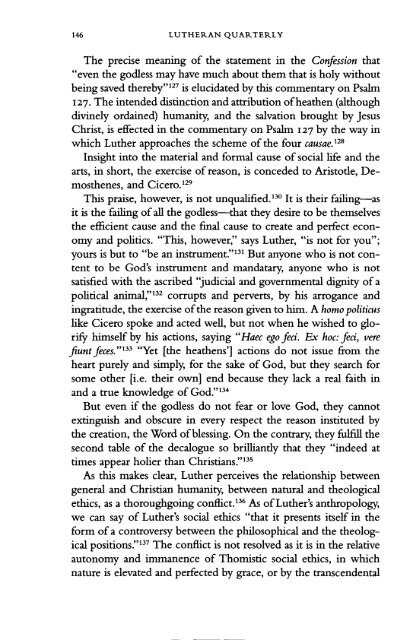
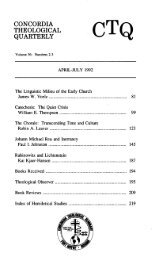
![VI nodaļa: CilvÄks â kas un kÄds viÅÅ¡ ir? [h]](https://img.yumpu.com/48350403/1/190x245/vi-nodaa-1-4-a-cilvaks-a-kas-un-kads-viaa-ir-h.jpg?quality=85)
